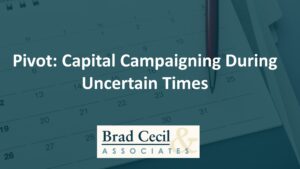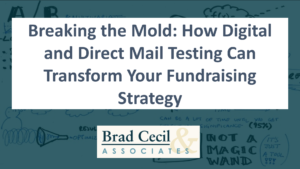“If you could say a word of thanks to the donors who make this food pantry possible, what would you say?” I asked.
“Well, I…” The woman paused, looking down to her lap, her child on one knee and the bag of food on the other. “I’d like to thank them, from the bottom of my heart. This food means everything to me.”
That moving expression of thanks – that single sentence – was what I came to hear.
I was out talking to families at a food pantry in Dallas to get some powerful narratives to use on behalf of one of our clients in its upcoming direct mail appeal. Why? People will always forget the numbers you give them, but they remember good storytelling.
Narratives engage the emotions and give the reader a compass – something to connect to. Good storytelling motivates donors to give.
So what makes a good story? The way it’s told. And to tell a great story, you’ll need a compelling character, information on that character and specifics about their situation.
Anyone can play journalist when it comes to interviewing your clients – no need for a special degree or experience in the field. With a few tips, you, too, will be able to uncover the same storytelling gold that I was.
It all starts with your tone — it’s not always easy to earn trust from someone who’s probably feeling pretty vulnerable, embarrassed and maybe even defensive. But if you introduce yourself kindly and explain that you’d love to talk for a few minutes to find out a little bit about her situation and how [insert your organization’s services] is going to be a help to her today, she’ll probably agree, even if it’s reluctantly. I always like to tell a client that I want to be able to share with donors – the people who make this service possible – why their gifts are important, and how they’re helping real people.
Next, because time is of the essence, jump right into the interview. People generally don’t have all day to chat, and you may be holding up a line.
If, for example, you work for a social service agency providing direct services, some important questions you’d want to ask your subject might be:
- Tell me a little bit about your situation…why did you need help today?
- Do you have any children, or is there anyone else at home besides you? If so, what are their names and ages?
- If he or she has kids, what are their favorite activities? Subjects in school? What do they want to be when they grow up? Anything the family likes to do together?
- Are you or anyone in your family in poor health? If so, what kind of hardships does that cause?
- When you get through this tough time, what are your dreams and goals for the future?
- Can you share any specific examples of something especially hard that happened recently?
- This one’s probably the most important question in the whole interview: If you could talk to the donors who give so that you can get the help you need today, what would you want to say to those generous people?
- And, as any good journalist does, I always end with the question: Is there anything else you’d like to share that I haven’t asked?
As you’re interviewing, it’s important to note details and emotions. Is your subject here straight from work, still wearing her button-up and slacks? Does her son haul around a trusted teddy bear? Is her tone hopeful, or discouraged? Each detail helps you weave a powerful, emotional narrative around the facts.
Once you’ve mined this crucial information from your interview, it’s time to construct your narrative. Remember that every good story has a hero. In this case, the donor is the hero – it’s his or her generous giving that makes the organization’s work possible.
Additionally, every good story takes its character on a journey with a clearly defined beginning, middle and end – the arc.
HERE’S AN ABBREVIATED EXAMPLE FROM ONE OF OUR RECENT DIRECT MAIL APPEALS:
Beginning: Oscar and Amelia, two retirees, are barely getting by on their meager fixed income.
Middle (conflict): As the cost of everything rises, Oscar and Amelia are sometimes faced with difficult decisions to make their fixed income stretch as far as possible – like whether or not they’ll be able to afford medicine or healthy groceries this month.
End (resolution): Thanks to your gifts, Oscar and Amelia can visit their local food pantry to pick up healthy foods to ensure that their golden years are just that.
The moment of transformation, where the character has found the relief he or she needs, is key to the narrative. It shows that the organization is improving lives, giving the donor a chance to be part of a successful mission.
So, the question is, what story is your organization telling?






2 thoughts on “The Power of the Story”